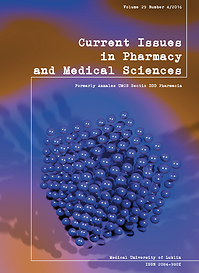Contemporary pharmacological obesity treatments
DOI:
https://doi.org/10.1515/cipms-2016-0012Keywords:
pharmacotherapy, obesity, drug, Body Mass IndexAbstract
In the last few years, obesity has become a global epidemic. Consequently, worldwide costs associated with managing obesity and obesity-related comorbidities are huge. Numerous studies have focused on discerning the appropriate proper treatment of weight related problems such as overweight and obesity. Moreover, many clinical trials have been conducted for many years in order to introduce effective anti-obesity drugs. The aim of the present review is to provide an overview of current and future pharmacotherapy for obesity, and to provide the reader with a determination of the concentration and composition of long and short term anti-obesity drugs, doing so by placing emphasis on pharmacotherapy and up-to-day solutions. It should be noted that, currently, the worldwide pharmacotherapy is represented by phendimetrazine, benzphetamine and diethylpropion, as well as by orlistat, lorcaserin, phentermine/topiramate, naltrexone/bupropion and liraglutide. In our paper, individual cases of patients’ needs are thoroughly illustrated by way of examples. Medical prescriptions and contraindications are also described.
References
1. Ben J.J., Stephen B.: The new era of drug therapy for obesity: the evidence and the expectations. Drugs, 75, 935, 2015.
2. Bragg R., Crannage E.: Review of pharmacotherapy options for the management of obesity. J. Ann. Assoc. Nurse. Pract., 10,1002/2327-6924.12279, 2015.
3. Bray G.A., Ryan D.H.: Update on obesity pharmacotherapy. Ann. NY. Acad. Sci., 1311, 1-13, 2014.
4. Główny Urząd Statystyczny: Notatka informacyjna Zdrowie i zachowanie zdrowotne mieszkańców Polski w świetle Europejskiego Ankietowego Badania Zdrowia (EHIS)., 5, 2014.
5. Hannah N.: What is obesity? http://www.medicalnewstoday.com/info/obesity/, 22.02.2015.
6. Hunt L.E. et al.: Complete re-sequencing of a 2Mb topological domain encompassing the FTO/IRXB genes identifies a novel obesity-associated region upstream of IRX5. Genome Med., 10,1186/s13073-015-0250-3, 2015.
7. Jensen M.D. et al.: Guideline for the Management of Overweight and Obesity in Adults: a report of the American College of Cardiology/American Heart Association Task Force on Practice Guidelines and The Obesity Society. J. Am. Coll. Cardiol., 63, 2985-3023, 2013.
8. Ogden C.L. et al.: Prevalence of childhood and adult obesity in the United States, 2011-2012. JAMA, 311, 806-14, 2014.
9. Patel D.: Pharmacotherapy for the management of obesity. Metabolism, 10, 1016, 2015.
10. Seger J.C. et al.: Obesity Algorithm®, http://www.asbp.org/obesityalgorithm.html, 22.12.2015.
11. Sweeting A.N et al.: Pharmacotherapy for the treatment of obesity. Mol. Cell. Endocrinol., 418, 173-183, 2015.
12. Wadden T.A. et al.: Weight maintenance and additional weight loss with liraglutide after low-calorie-diet-induced weight loss. The SCALE Maintenance randomized study. Int. J. Obes. Lond., 37(11), 1443-51, 2013.
13. Weissman N.J.: Echocardiographic assessment of cardiac valvular regurgitation with lorcaserin from analysis of 3 phase 3 clinical trials. Circ. Cardiovasc. Imaging., 6(4), 560-7, 2013.
14. World Health Organization: Global status report on noncommunicable diseases, 2014, www.apps.who.int/iris/bitstream/10665/148114/1/9789241564854_eng.pdf?ua=1.
15. Yanovski S.Z., Yanovski J.A.: Long-term drug treatment for obesity: a systematic and clinical review. JAMA., 311,74–86, 2014.
Downloads
Published
Issue
Section
License
Copyright (c) 2016 Authors

This work is licensed under a Creative Commons Attribution-NonCommercial-NoDerivatives 3.0 Unported License.


